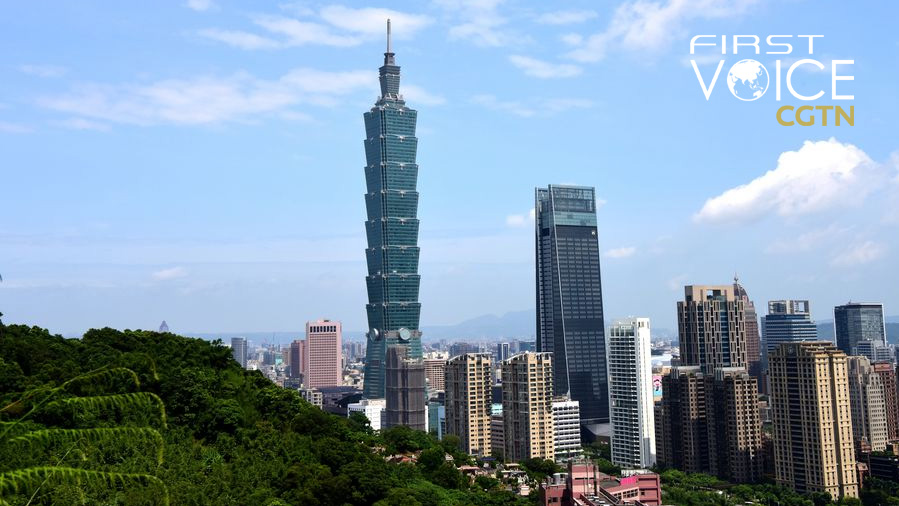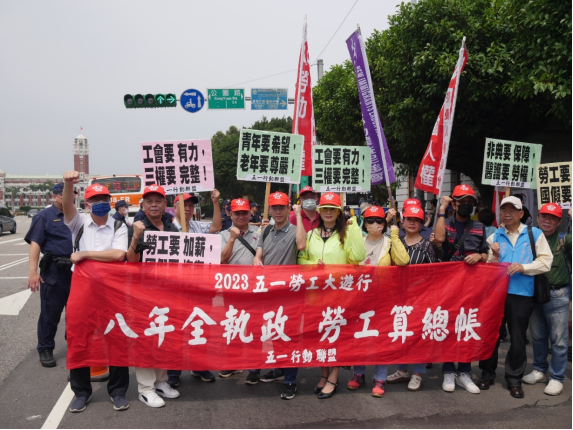
Taipei 101 skyscraper in Taipei, southeast China's Taiwan. [Photo/Xinhua]
Editor's note: CGTN's First Voice provides instant commentary on breaking stories. The column clarifies emerging issues and better defines the news agenda, offering a Chinese perspective on the latest global events.
The U.S. is happy to manifest its determination of "protecting" China's Taiwan – by selling wars to the region.
Some 30 U.S. defense contractors are currently on a visit to China's Taiwan region to explore opportunities for deeper cooperation, with advanced fighter jets and drones in focus. Retired Lt. Gen. Steven Rudder, heading the delegation, stressed Washington's willingness of being part of defense capabilities in the region. "For the Asia-Pacific, I would offer there's not another more important area in the world to maintain peace," Rudder said at the Defense Industry Forum in Taiwan.
Washington loves to talk peace, but all it knows is war. After all, the U.S. relies on wars to survive and prosper.
Wars and preparations for hostilities can easily woo bipartisan support for a surge in Pentagon spending – thus creating a boom for weapon makers. In 2022, as the U.S.-led Western bloc was throwing tens of billions of dollars’ worth of military aid to Ukraine, defense contractors are reaping colossal profits. Escalating tensions in the battlefields have sent their stocks surging: Northrop Grumman's stock price soared by 40 percent and Lockheed Martin's by 37 percent by the end of 2022, according to ABC News.
The military-industrial complex (MIC) has been a pillar of U.S. hegemony. The tremendous military demand from wars since World War II – for instance, the Vietnam War and the Korean War – have catalyzed the U.S. economic boom. A substantial portion of the weaponry in wars that broke out in the 21st century came from the United States, stimulating the country's industrial military establishment.
To sustain its pillar of hegemony, wars must be created to feed defense contractors, members of Congress, and lobbying groups waiting for their lucrative scraps. Having made skyscrapers full of money from Ukraine last year, military-industrial giants are now diverting their attention to China's Taiwan region. American politicians and think tanks have ramped up their efforts in hyping the Taiwan question and promoting military cooperation with Taiwan authorities – all in an attempt to stoke tensions across the Straits.
American defense contractors' trip to Taiwan is to fuel, not prevent, a potential war.
The U.S. delegation was looking at cooperation in the production of certain products, according to media reports. This is unlikely to promote the military capability of Taiwan. After all, there is little likelihood that Washington will allow any high-end weaponry technologies to be transferred to the region.
In addition, the overwhelming military gap, which is still expanding with time, between the Chinese mainland and the Taiwan region means Washington's military aid – be it arms sales or the co-production of weapons – will be helpless in "defending" the region. The attempt by the U.S. and Taiwan authorities to intensify military cooperation is bleeding Taiwan to feed the American military-industrial complex.

Protesters march demanding better living conditions in Taipei, China's Taiwan, May 1, 2023. [Photo/Xinhua]
People in Taiwan need peace and development – not a bullet.
Joint weapon production and any other forms of intensified ties with Washington mean Taiwan authorities will have to take money from improving people's livelihood to courting Washington, and the war game will eventually make local people the biggest victim. This is not what the people in Taiwan are happy to see. "American warmongers are a scourge on Taiwan," read one of the banners as Taiwan people were protesting the visit in Taipei.
It is worth noting that Taiwan's trade-driven economy, amid global inflation, is likely to grow more slowly in 2023 as a result of the slump in exports on weakening external demands, according to officials. In addition, local people are facing more difficulties in dealing with water and electricity this year. Against this backdrop, Taiwan authorities are making a wrong choice between the need to revive the economy and the thirst for "protection" from Washington.
Touting itself as the "guardian of global peace," the U.S. has been selling wars across the world. From Vietnam to Kosovo, from Iraq to Afghanistan, from Syria to Ukraine, local people are paying the price for Washington's "protection" – while the U.S. saw the stocks of its military-industrial giants soaring.
People in Taiwan have the wisdom to figure out the dirty calculations behind the defense contractors' trip. Taiwan authorities' obsession with "military cooperation" with Washington will lead the region onto a dangerous path, but they still made the wrong choice of bleeding its people to feed the American military industrial complex.

 中文
中文



